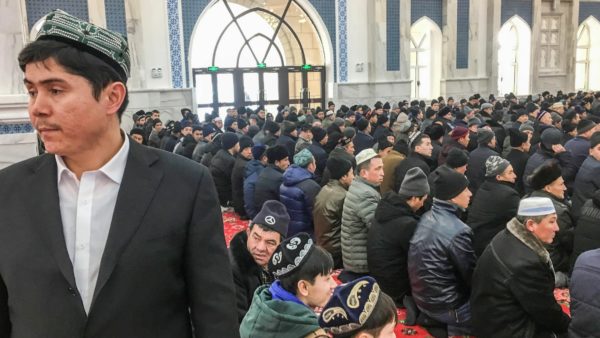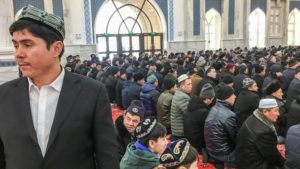Pakistan’s silence on fasting ban for China Uighurs riles activists

Nikkie Asian Review, 20 May 2019
 By Adnan Aamir As the Muslim holy month of Ramadan started in early May, news of a fasting ban imposed on Uighurs by the Chinese government went viral on social media in Pakistan. In response, some influential Pakistanis with sizable numbers of followers on social media heaped criticism onto China for its treatment of Uighurs and urged their government in Islamabad to confront Beijing over the matter.
By Adnan Aamir As the Muslim holy month of Ramadan started in early May, news of a fasting ban imposed on Uighurs by the Chinese government went viral on social media in Pakistan. In response, some influential Pakistanis with sizable numbers of followers on social media heaped criticism onto China for its treatment of Uighurs and urged their government in Islamabad to confront Beijing over the matter.
Pakistan’s government traditionally has championed the rights of Muslims around the world, most notably in Kashmir, Myanmar and the Palestinian territories. Separate rallies in support of Kashmiri and Palestinian Muslims are held annually in Pakistan. But the Pakistani government and the public at large have been indifferent to action taken against China’s Uighur population.
China has faced condemnation from foreign governments and international human-rights groups over its internment and treatment of roughly 1 million Uighurs and other Muslim minorities in “re-education camps” in the western autonomous region of Xinjiang.
While Beijing claims it is fighting terrorism, the government has sought to suppress Islam in Xinjiang for decades. Roughly half of the region’s 24 million people are Uighur, and their Muslim religion and challenge to Chinese rule has long been a complication for China.
Last September, Pakistani Minister for Religious Affairs Noor-ul-Haq Qadri met China’s ambassador to Pakistan, Yao Xing, and demanded that Uighur Muslims be granted relaxation from alleged detention, according to Pakistan media. But just days later, Qadri backtracked on his comments after China took exception to his demands.
A week later, a Chinese Foreign Ministry spokesperson in Beijing denied that the Uighur issue was ever discussed at the Qadri-Yao meeting, saying that only Pakistan-China relations were discussed.
However, sources and experts say that China had asked Pakistan’s government not to interfere in what Beijing considers to be an internal matter.
Mohan Malik, professor at the Daniel K. Inouye Asia-Pacific Center for Security Studies in Hawaii, believes that Pakistan has not only consistently refused to condemn Chinese atrocities against Uighurs but has long “carried the water” for China in the Islamic world.
“Pakistan has ensured that the Organization of Islamic Countries does not pass any resolution condemning China’s harsh treatment of Uighur Muslims,” he told Nikkei Asian Review.
Some observers believe that the $62 billion China-Pakistan Economic Corridor, or CPEC, a flagship project in Beijing’s sprawling Belt and Road Initiative, has provided reasons for Pakistan’s government to look the other way on the Uighur issue. Over the past four years, Pakistan has relied heavily on Chinese investment and loans to support its ailing economy.
And Pakistani Prime Minister Imran Khan pleaded ignorance about the treatment of Uighurs in Xinjiang in an interview with the Financial Times in March.
Peter Irwin, program manager of the World Uyghur Congress, noted that government officials in Pakistan have been quiet on the matter. “Their silence has been disheartening, but altogether expected, given the development of the economic relationship between the two countries over the past decade.”
Earlier this year, several journalists and prominent social-media figures in Pakistan raised the issue of the fasting ban, prompting Chinese Deputy Chief of Mission in Islamabad, Lijian Zhao, to defend his country’s actions. Zhao said the ban applied only to members of the Communist Party, students and government officials. However, a report from Amnesty International published on May 3 stated that the ban is for virtually all Muslims in Xinjiang.
Still, news of the ban on fasting — an important practice during Ramadan — has not led to the type of mass anger seen for Kashmir and the Palestinian issue.
Subukh Sayeed, a journalist covering religious issues in Pakistan, believes that the treatment of Uighurs in China will not lead to a noticeable reaction in Pakistan until the subject is widely reported by domestic news media and picked up by religious political parties.
Observers say that the Uighur issue has not led to attacks against Chinese targets in Pakistan, although that remains a concern. Experts note that recent violence on Chinese businessmen and other workers in Pakistan — such as a militant attack earlier this month at a luxury hotel in the port city of Gwadar — were carried out by Baloch insurgents, who are ethnic nationalists, and that religion is not a motivating factor.
Over the past couple of months, China’s public image in Pakistan has suffered after revelations over the smuggling of young Pakistani brides to China — allegedly for the sex trade industry and organ harvesting, although China has denied those allegations — unleashing rare fury.
But it remains to be seen whether that anger, coupled with the fasting ban and other action taken against Uighurs in Xinjiang, will create enough resentment among the Pakistani public to force the government to confront China.
Malik Siraj Akbar, a Washington-based analyst, believes that even if Pakistanis on social media pressure the government to address the issue with Beijing, Pakistan does not have any leverage over China.
“Beijing does not accept ‘dictations’ from foreign countries, even as influential as the United States, on its domestic issues, especially on issues pertaining to human rights,” he said. “I don’t think Pakistan has the will or the power to force the Chinese to change their policies [for Uighurs].”


